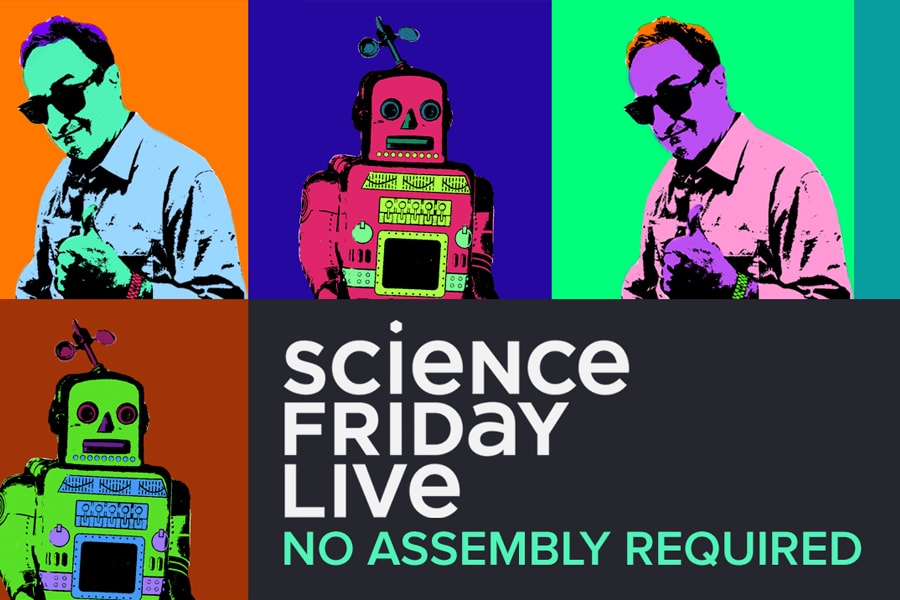"No Assembly Required" for CMU Students, Faculty at Science Friday's Pittsburgh Show
Wednesday, May 23, 2018 - by Julie Mattera

Robots who converse, provide empathy and play music were among the reasons NPR's "Science Friday" visited the Carnegie of Homestead Music Hall on Saturday, May 19, to build a show about Pittsburgh scientists and roboticists. The special live event had the theme "No Assembly Required," and included interviews with Carnegie Mellon University faculty and students.
"Science Friday" host Ira Flatow said that 90.5 WESA had invited the show to town for a night of science entertaiment.
"We were especially excited about this one, because we cover so much robotics and artificial intelligence on Science Friday," Flatow said. "We know Pittsburgh's a powerhouse in that type of research, so we sent our producers hunting for roboticists, designers and artists who could make those topics come to life on stage. We loved our time in Pittsburgh and hope to be back soon!"
The Pittsburgh interviews were featured on the May 25 broadcast of Science Friday; you can listen to the segments online at the program website.
Here's a look at who appeared on the show.
Justine Cassell, associate dean for technology, strategy and impact in the School of Computer Science and a professor in the Language Technologies Institute
Cassell has worked for decades on artificial intelligence that can hold a conversation, teach and otherwise build rapport with humans. Her projects include a virtual assistant that helped global leaders navigate the World Economic Forum in Davos, Switzerland, last year, and a classroom tutor for students struggling in STEM topics. Cassell discusses the value of studying relationships to further AI research.
Few friends dropped by @scifri #scfripgh. https://t.co/Z7vGAQ4Ypq pic.twitter.com/x1ahhz49x8
— Ira Flatow (@iraflatow) May 20, 2018
Madeline Gannon, an alumna with a doctorate in computational design and architecture; and Henny Admoni, an assistant professor who leads the Human and Robot Partners (HARP) Lab
Five years ago, it was hard to find a home robot that wasn't a Roomba. Today, it's not just vacuuming robots, but personal assistants like Alexa, videographers like Kuri and more. But what about robots that can assist people with mobility impairments? Admoni, a Carnegie Mellon roboticist, is designing robots that can autonomously anticipate our needs. And Gannon, an artist-roboticist, brings enormous industrial robots to our level — teaching machines that were never meant to be cute how to nevertheless earn our trust.
Roger Dannenberg, professor of computer science, art and music; and Eric Singer, a CMU alumnus with a bachelor's degree in electrical and computer engineering
Dannenberg has taught machines to analyze music archives and spit out new music based on the results. Judge for yourself whether one of those tunes could break the Top 40. Plus, the Carnegie Science Center has added a new robot to its collection — a spiral xylophone that plays itself. Singer, a musician and roboticist, joins to talk about designing autonomous instruments and shows off a self-playing guitar he designed.
Lining Yao, assistant professor in the Human-Computer Interaction Institute
What if a box of IKEA furniture could put itself together? What if clothing could respond to human skin conditions to keep you cool, or even safe? It's all within the realm of possibility with "adaptive materials." Yao, director of Carnegie Mellon's Morphing Matter Lab, brought transformative fabric, self-folding furniture — even flat pasta — to life on stage.
#scifripgh music Prep for tonight’s @scifri live show. @townsppl_ https://t.co/L0ID3firEh pic.twitter.com/mUdWlblWM1
— Ira Flatow (@iraflatow) May 19, 2018
People of Pittsburgh: IT IS HAPPENING. Prepping for @scifri from @clmusichall @905wesa pic.twitter.com/c34jTbEzpp
— Charles Bergquist (@cbquist) May 19, 2018
For more information, Contact:
Byron Spice | 412-268-9068 | bspice@cs.cmu.edu